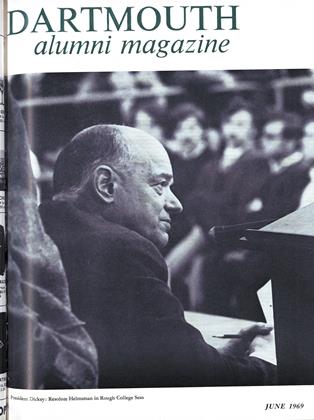At the tag end of the Great Depression, two Dartmouth undergraduates shared a pulpit at the Congregational Church in Cornish, N. H. "We milked cows to eat and preached for tobacco money," LARRY DURGIN '40 recalled recently. "The farmer paid 1½ cents per quart of milk. I got to know the problems of the rural poor, the voiceless, the politically, economically and spiritually deprived. I had been president of the Dartmouth Christian Union, but I resisted a religious vocation. Roy Chamberlin (then pastor of Hanover's White Church), Prof. John Mecklin and others influenced me, but my father had been secretary of the YMCA in Tokyo for 30 years and I resisted. The experience at Cornish was decisive."
Larry Durgin is now the REV. LAWRENCE L. DURGIN, D.D., pastor of the historic Broadway United Church of Christ in New York City. He earned his divinity degree at the Oberlin Graduate School of Divinity. He chose the Congregational ministry because it seemed to offer the greatest opportunities for active involvement in social as well as spiritual matters. Pastorates in Long Island, Norwich, N. Y., Providence, R. I., and finally New York followed. Along the way he had served as president of the Rhode Island Council of Churches and of the Manhattan Division of The Protestant Council; he became a trustee of Tougaloo (Miss.) College and of the Northfield (Mass.) Schools, a director of the Homeland Ministries, and a member of the New York Urban Coalition. And there were honorary degrees from Brown and Oberlin too.
His current pastorate at the Broadway Church was a rare mating of pastor and congregation. The church had a long history of social involvement—abolition (it was a station on the Underground Railroad), freedom of expression and belief, the world-wide missions, the peace movement, racial injustice, poverty, and ecumenism.
Concern for the poverty-stricken, stemming partly from Cornish, and his deep belief in ecumenism recently led to his gaining a new title - "co-pastor of St. Paul the Apostle Roman Catholic Church." His church, the 60- year-old French Gothic Broadway Tabernacle, was decaying rapidly as was the West Side neighborhood. New skyscraper buildings and the Lincoln Center for the Performing Arts were rising alongside decaying apartments which housed the urban poor. Costs of just maintaining the church, let alone remodeling it, were staggering. In an informal talk with Father Francis X. Ryan, pastor of nearby St. Paul's, Dr. Durgin confided that the Broadway Tabernacle would have to come down. The congregation was considering other sites, he said, but would prefer to stay in the neighborhood and to use its resources of money and talent to improve social conditions.
"Why not hold your services here at St. Paul's," Father Ryan suggested, "and use your resources for community projects?" He offered the "prime time" hour of 11 a.m. Sunday (the usual High Mass hour at St. Paul's) to the Broadway Church. And it would be rent-free, Father Ryan insisted. Dr. Durgin and Father Ryan had become close friends through involvement in West Side community betterment; the suggested arrangement would enable them to continue this work and perhaps contribute significantly to ecumenism.
The offer was accepted and on March 2 the first United Church of Christ services were offered in the huge, cathedral-like St. Paul's Church.
In his sermon, Dr. Durgin said: Please dont mis understand. I am not leading my flock back to Rome. Worship here and where we came from are one and the same. We have come a short distance in space, but about 400 years in time."
So, while theologians wrestled with doctrinal divisions within Christianity, two congregations found a way to move a step closer.
And what ever happened to George Dreher '41, who shared the pulpit and the milking at Cornish? "The experience helped him too. He is a minister now," Dr. Durgin replied.
 View Full Issue
View Full Issue
More From This Issue
-
 Feature
FeatureEight Graduates of Dartmouth Who Were First College Presidents
June 1969 By John Hurd '21 -
 Feature
FeatureTwelve Hours and Their Aftermath: The Student Seizure of Parkhurst Hall
June 1969 By C.E.W. -
 Feature
FeatureThe Class Officers Weekend
June 1969 -
 Feature
FeatureFOUR PROFESSORS WHO ARE RETIRING
June 1969 -
 Feature
FeatureBicentennial Year Begins June 14
June 1969 -
 Article
ArticleAlumni Awards
June 1969
GEORGE O'CONNELL
-
 Article
Article"They're Rooms — Not Units"
May 1961 By GEORGE O'CONNELL -
 Article
ArticleTHE FACULTY
February 1962 By GEORGE O'CONNELL -
 Article
ArticleTHE FACULTY
June 1962 By GEORGE O'CONNELL -
 Article
ArticleTHE FACULTY
DECEMBER 1964 By GEORGE O'CONNELL -
 Article
ArticleTHE FACULTY
APRIL 1965 By GEORGE O'CONNELL -
 Article
ArticleThe Faculty
JANUARY 1967 By GEORGE O'CONNELL







